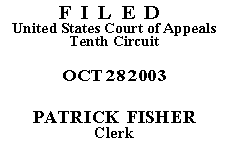

| NASRULLA KHAN,
Plaintiff-Appellant, v. GLENN J. MECHAM; ROCKY J. FLUHART; JON GREINER; A.K. GREENWOOD; OGDEN CITY COUNCIL; OGDEN CITY CORPORATION; RALPH W. MITCHELL; GLEN V. HOLLEY; KENNETH J. ALFORD; GARTH B. DAY; RICK J. MAYER; JESSE M. GARCIA; ADELE SMITH,
Defendants-Appellees. |
|
The district court dismissed this case by adopting the conclusion of the magistrate judge's report and recommendation that Khan's claims against the City, its key employees, and members of its Council were barred by res judicata because Khan could have included the defendants as parties in previous litigation. Khan filed for sanctions below and has done so again on appeal. Defendants-appellees filed for sanctions in the district court, but have not done so on appeal. We affirm the district court's decision and deny Khan's motion for sanctions as frivolous. We also sua sponte bar Khan from filing an appeal again on the same subject matter.
This case is Khan's fifth separate appeal on exactly the same facts, but against slightly different parties. In Khan v. Lucas, 33 Fed. Appx. 381 (10th Cir. Feb. 6, 2002) ("Khan I"), cert. denied, 537 U.S. 977 (2002), we reviewed de novo the merits of Khan's case against the City of Ogden and state prosecutors, and we agreed that Khan had failed to state a cognizable claim under the Fourteenth Amendment or in tort. Id. at 384. The parties to the instant case note that Khan attempted to amend his complaint in Khan I to include the current defendants-appellees, but that Khan's motion to amend was denied in Khan I as futile. Aplt. Br. at 21; Aple. Br. at 2. When we reviewed Khan's appeal in Khan I, we found that the district court had not abused its discretion in denying Khan's motion to amend his complaint. 33 Fed. Appx. at 385.
In Khan v. Thorley, 23 Fed. Appx. 978 (10th Cir. Dec. 21, 2001) ("Khan II"), we upheld the dismissal of Khan's similar case against federal investigatory authorities on the ground of collateral estoppel. Id. at 980.(1) Khan had argued, among other things, that collateral estoppel should not apply to bar his claims against federal authorities in Khan II because those authorities had not been parties to Khan I. Id. at 980. In affirming the dismissal of Khan II on the ground of collateral estoppel, we noted that the two cases nonetheless used the same record and relied upon the same allegations. Id.
Khan also filed two earlier appeals that the Tenth Circuit dismissed for procedural reasons. In re: Khan, No. 00-4187, was dismissed in March of 1991 for failure to pay the filing fee. In that case, Khan had served the district court in Utah to compel action through petition for a writ of mandamus. A preliminary version of Khan II (Khan v. Thorley, No. 01-4246) was dismissed in May of 2002 for failure to meet a filing deadline.
We now AFFIRM the dismissal of the case at bar for substantially the reason stated by the magistrate judge and adopted by the district court. Because Khan litigated the denial of his motion to amend his complaint to include the current defendants-appellees in his appeal of Khan I, he is precluded from litigating the same issue again. We DENY Khan's motion for sanctions on appeal as frivolous. Finally, we sua sponte bar Khan from filing additional appeals regarding the same subject matter as in Khan I, Khan II, and the instant case, and warn Khan that he will be subject to sanctions in the future should he file an appeal in the Tenth Circuit regarding this subject matter. See generally Christensen v. Ward, 916 F.2d 1462, 1469 (10th Cir. 1990) (noting that this court has the power "to impose sanctions such as costs, attorneys fees and double costs for the filing of frivolous appeals, Fed. R. App. P. 38, and the inherent power to impose sanctions that are necessary to regulate the docket, promote judicial efficiency, and . . . to deter frivolous filings.").
Entered for the Court
Circuit Judge
*. After examining the briefs and appellate record, this panel has determined unanimously that oral argument would not materially assist the determination of this appeal. See Fed. R. App. P. 34(a)(2); 10th Cir. R. 34.1(G). The case is therefore ordered submitted without oral argument. This order and judgment is not binding precedent, except under the doctrines of law of the case, res judicata, and collateral estoppel. The court generally disfavors the citation of orders and judgments; nevertheless, an order and judgment may be cited under the terms and conditions of 10th Cir. R. 36.3.
1. The fact that the Tenth Circuit issued the Khan II opinion before the Khan I opinion appears to have been a quirk of filing. Indeed, the Khan II opinion notes in a footnote that the validity of its reasoning was not affected by the fact that the appeal in Khan I was still pending. Khan II, 23 Fed. Appx. at 981 n.2.